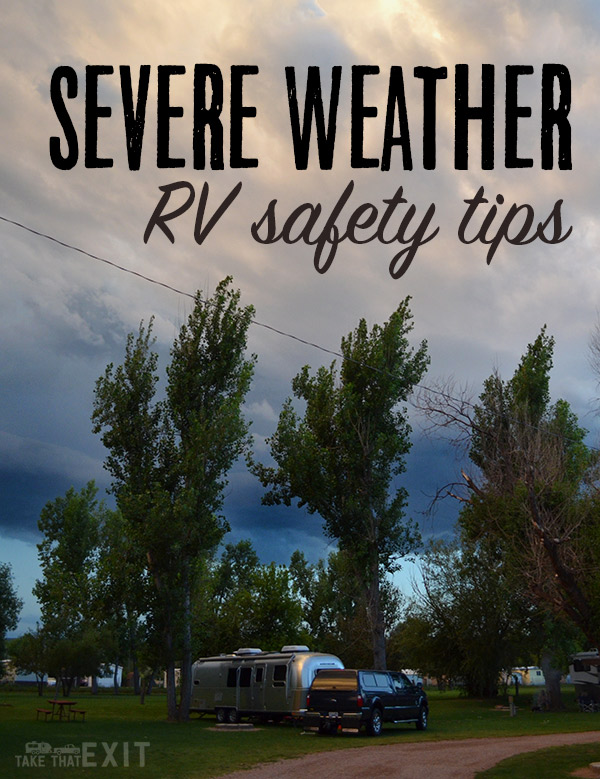
Severe weather RV safety tips
Weather (and severe weather) is a part of life. When we lived in a regular ole house I paid little attention to the weather – being near Seattle, Washington it was almost always rain of some kind in the fall/winter and moderate temps in the spring/summer. It was nearly always manageable and all we really needed was a lot of layers and a decent rain jacket and umbrella.
Being on the road weather is a different story. Knowing the local weather is part of our daily routine – because severe weather could have severe impacts when you live in a house on wheels. We planned our route around the country primarily because of weather – the northern areas in the summer, the east coast in the fall and Florida/South in the winter. So far, this plan has worked in our favor and we’ve experience very little inclement weather.
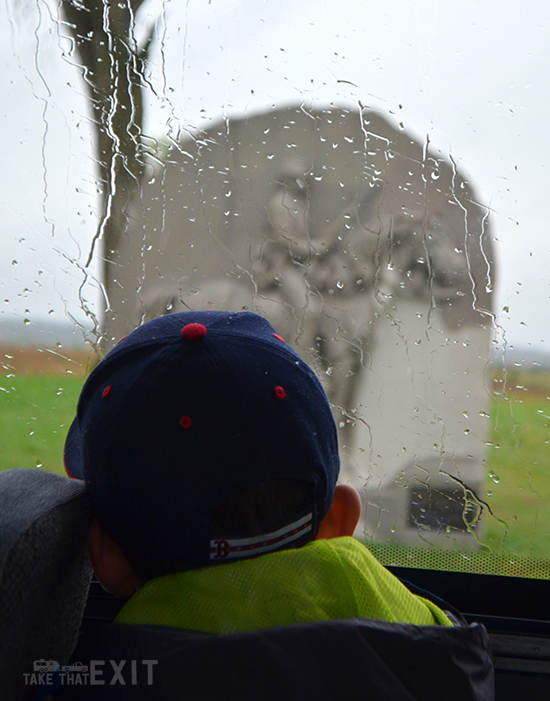
We did change our plans last October to avoid Hurricane Joaquin which was slated to hit the east coast. Instead of being in New Jersey like we had originally planned, we headed inland to Gettysburg, Pennsylvania to avoid the storm. We ended up with only a rainy weekend – and enjoyed an awesome tour of Gettysburg. And South Dakota last summer was frustrating because the tornado and hail alerts seemed like a daily occurrence – but we avoided them by racing across the state and setting up camp in Minnesota.
Lately central Florida (thanks to El Nino) has been throwing us some strange and unpredictable weather – like tornados. For example, last week while we were in the Fort Myers area we knew severe thunderstorms were expected to hit Saturday night. We would have probably rerouted to be farther north for the storm, but we had a repair appointment in the area all day Saturday. We couldn’t reschedule the repair appointment – we needed our water pump replaced – and RV repair appointments are tough to find in Florida in January.
We left our repair appointment in Fort Myers around 3 p.m. and started heading north to our reserved campsite, which turned out to be a disaster. It’s a long story – but the private campground where we planned to stay at was crowded, flooded, muddy and was too small for our trailer. It wouldn’t have worked – not even a little. So we scrambled to find another spot and thankfully ended up finding an opening at Sun-n-Fun RV resort up near Sarasota. More expensive than we usually pay for a spot, it was a gravel spot (no mud or flooding potential) and I knew it was a well populated park with lots of services and buildings. We ended up setting up camp in the dark (something we never do) and spent the night playing in the heated pool and relaxing in the family hot tub knowing the rain/storm would start around 2 a.m.
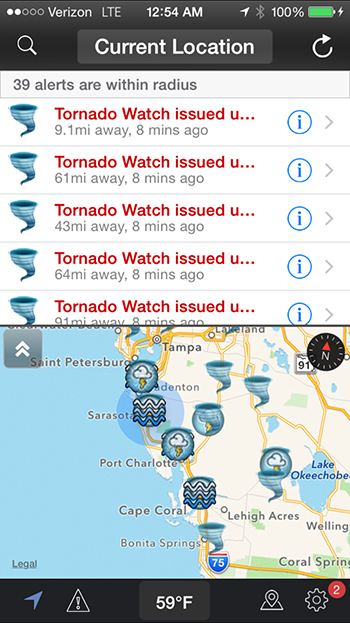
I went to bed earlier than usual because I was expecting the storm. At around 1 a.m. I was woken up by a Tornado Watch alert on my phone. A tornado watch means there is a strong probability of a tornado but one hasn’t formed yet – I stayed up and monitored the storm after that. Around 2:40 a.m. the wind had picked up and I pulled the kids into bed with me.
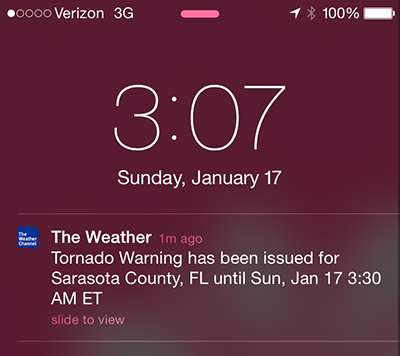
At 3:06 a.m. the Tornado Warning went off – this means a tornado is developing and you need to take cover immediately. Trailers and mobile homes are NOT a safe shelter option. We pulled on sweatshirts, slipped on shoes and were out the door within a couple minutes. We ran to the nearby cement foundation bathhouse and took shelter in an interior wall of the building – on the floor of a men’s shower stall. We were joined in the bathhouse by dozens of other people from the park.
We would spent the next couple hours hanging out in the shower stall in the bathhouse. Tracking alerts on our phone and waiting. We had our hotspot with us – so the kids watched Netflix, which was a great distraction as they were understandably shaken by the experience.
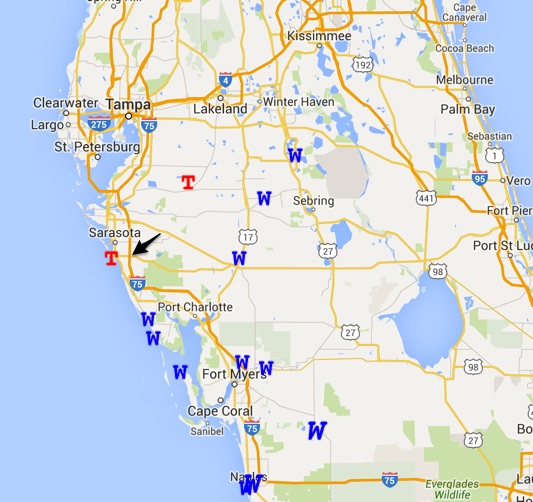
Two tornados touched down that night in Sarasota County, Florida. One just about 13 miles away (see map above, the Ts mark the tornados, black arrow is us). We were lucky to avoid any damage but others were not so lucky – many houses, condos and mobile homes were destroyed in the area. Coming from the Northwest this was our first tornado warning and I’m hoping our last.
So what can we do to protect ourselves against severe weather while traveling full time? Here are a few suggestions for products or supplies that can help keep you safe. . .
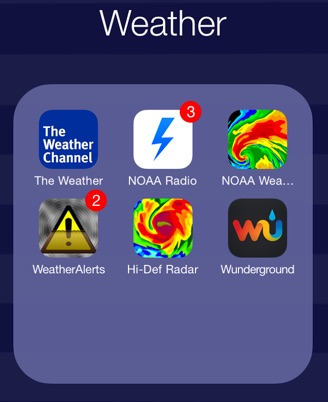
Download a few weather apps on your smart phone. I have six weather apps on my phone. I use them all for different things. At the bare minimum, I recommend the NOAA radio app – it’s $3.99 and worth every penny. Get real-time updates straight from the National Weather Service – and it has the ability to notify you of warnings even if your device is asleep and locked. I think having more than one weather app is wise – I’d rather receive multiple alerts than be counting on only ONE app for alerts and find that it didn’t work, right? I also have the Weather Underground and NOAA Weather Alerts apps, plus a couple radar apps and the Weather Channel app. Depending on your needs, you can download a weather app bundle that will save you a few bucks (like this Severe Weather bundle). The NOAA Weather Alerts is probably my favorite – it’s super easy to navigate, shows a list of alerts AND a map of alerts – and shows you where you are, so you can clearly see where you are in the boundary. It also seems to be super quick in sending alerts.
Downloading the apps is NOT enough – make sure you tweak the settings to use your current location and to set up AUDIBLE alerts in the case of an emergency.
Have a NOAA radio in your RV. How would you get weather warnings if your smart phone or computer wasn’t working or you’re in an area with no internet/cell service? A NOAA radio can be set to turn on and audibly notify you if there is a severe warning in your area. Something like this American Red Cross FRX3 Hand Crank NOAA AM/FM Weather Alert Radio with Smartphone Charger
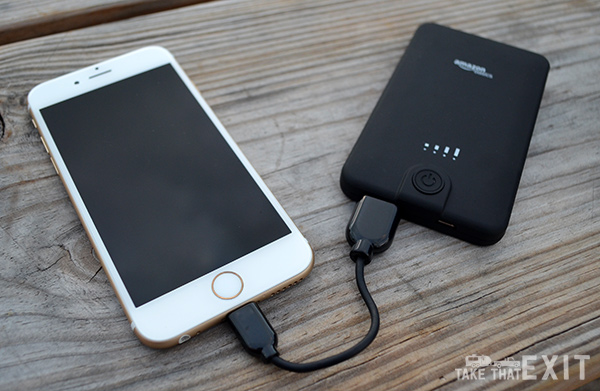
Cell phone charger. How long will your phone battery life last if you’re constantly monitoring storm coverage? I know mine wouldn’t last long enough so we have the AmazonBasics Portable Power Bank – 16,100 mAh. It charges my phone quickly and it fits easily in my back pocket or purse. It can charge other small devices as well. I also ordered the lightning cable for it.
Headlamps or flashlights. We always keep a headlamp hanging right by the front door. If we needed to run outside in a hurry, in the dark, it’s immediately accessible. We also have an emergency drawer in the living area that has a collection of other headlamps and flashlights (it’s also where we store our NOAA radio and batteries). A camping lantern is a great choice as well. We have two camping lanterns and they come in handy when you want to hang out with friends after dark without a campfire.
Batteries. Stock up. We usually buy them at Costco but Amazon has had some impressive prices on their AmazonBasics AAA Performance Alkaline Batteries (20-Pack) lately – you want enough batteries for your NOAA radio, flashlights and headlamps
Emergency backpack. What would you need for safety if you suddenly had to leave your RV or trailer? Fill a durable backpack with water, high-protein snacks, warm clothes, flashlight/headlamp, cell phone chargers, small toys to distract/entertain young children, emergency contact information, insurance information, ID/passport, credit card and/or cash, essential medications, small blanket, NOAA radio, etc.
Emergency food/water supply. We keep two large containers of water (like this Coleman Water Carrier (5-Gallon, Blue) in the back of our truck (changing out water often to keep it fresh) and we have a Mountain House, Just In Case… Classic Bucket
in the back of our truck. Both would be necessary if we were stranded in our truck somewhere.
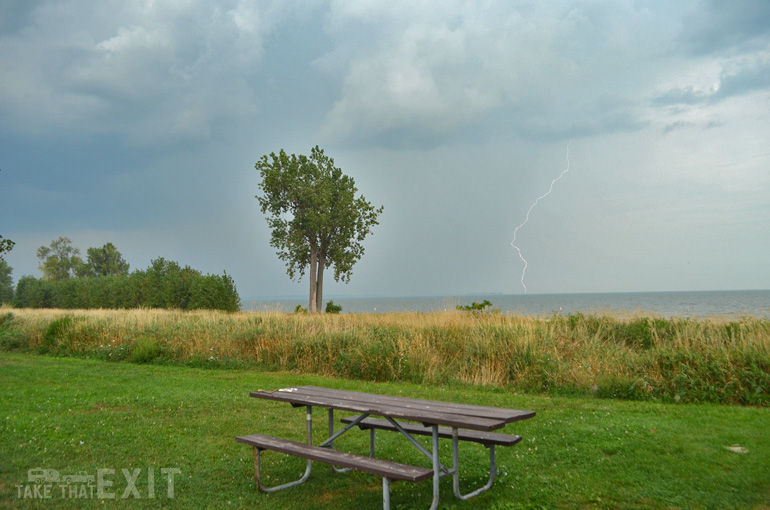
In addition to those products and apps, here are a few more things to consider. . .
1.) Keep an eye on the forecast. Often severe weather conditions can be predicted at least a few days in advance. Consider re-routing or moving to avoid severe storms. Bookmark Weather.com and check it daily – you can see a 10-forecast that I find is often pretty reliable.
2.) Your safety is your responsibility. In the case of an emergency or severe weather your safety is YOUR responsibility. Don’t rely on your campground to notify you, don’t expect neighbors to knock on your door – it’s your job to be alert and aware of severe weather. Don’t be shy to ask for emergency routes or shelter options when you check-in (it’s recommended!) and don’t be shy to hang out in the men’s shower stall – even if no one else has evacuated yet. We were the first people to take shelter at our campground – I second guessed myself because this was my first tornado warning – but we stayed put and were soon joined by the rest of the RVers in our loop. It’s better to be overly cautious than to wait and see – you might find you’re too late.
3.) Know your nearest shelter or evacuation route. Make it a point to know where the nearest shelter is – make sure your kids know, too. You can ask this information when you check in to an RV park. Most state parks have cement bath houses.
4.) Have your RV park address and site number easily accessible. Write the RV park name, address, site location and front desk info on a dry erase board or piece of paper somewhere easily accessible in the living space of your RV. If you need to dial 9-1-1 you’ll need that information to get emergency personnel to you as soon as possible. We often leave the campground map out for easy access.
5.) Know what COUNTY you are in. Weather alerts are often issued by county. You should know which county you are currently located in and it doesn’t hurt to know the names of surrounding counties either.
6.) Prepare the outside of your RV or campsite. Reduce the risk of damage by putting away things that can blow around. Retract awnings, retract slides (if applicable), put away chairs or camp kitchens – you don’t want these things slamming into the outside of your RV.
7.) Don’t try and outrun a surprise storm. If you’ve waited too long and/or get caught by a surprise storm – don’t panic and try to hitch up and run. We were foolish early in our journey and did this in South Dakota after getting alerts about a possible hail storm (1 inch hail) headed our way. We hitched up in the dark, in heavy rain and headed out to find shelter under a nearby carwash. Turns out we wouldn’t easily fit in the car wash bay (a few classic cars had beat us to the spots anyway), the hail didn’t end up crossing our path, and we were put ourselves at risk by hitching up in a hurry and rushing to seek shelter. In hindsight it was a stupid choice that was rooted in panic – we won’t do that again. Next time we’ll stay put, seek another shelter if needed, leave the trailer and take the truck, and/or deal with the damage if it happens.
8.) Make sure your insurance is adequate. If your RV is your full-time home do you have adequate insurance to replace it in the event of an emergency? Talk to your insurance agent and make sure you have a full-time policy and that it is sufficient enough to cover your needs. Some policies even include hotel/living expenses if you’re unable to live in your RV due to repairs or replacement. Full-time RV insurance policies don’t always give you the same protection that a homeowners policy does (providing liability insurance while you’re out away from your trailer, for example), so an umbrella policy might be a good idea. Talk to your insurance agent to make sure you’re adequately covered.
9.) You can replace your RV but you can’t replace a life. At the end of the day there are no possessions in your RV that are more important than your life. Seek shelter if needed and worry about property loss later (see #8).
10.) Stay calm. Don’t panic. Have a plan in place and follow through with it calmly. Panic is not your friend.
I’m not a certified weather woman, I’m also not an expert on emergency preparedness – I’m just relaying some of the ways that we work to stay safe on the road. Please practice due diligence and research what emergency tools or apps will best serve your family – remember that your safety is your responsibility.
At the end of the day preparation and planning are your best weapons against any emergency – especially severe weather. We can’t predict all the emergencies we might encounter but we shouldn’t let that keep us from enjoying life on the road. Safe travels to you. . . .
What tips do you have for being safe while traveling in an RV? Please leave a comment and share your favorite severe weather RV tips!
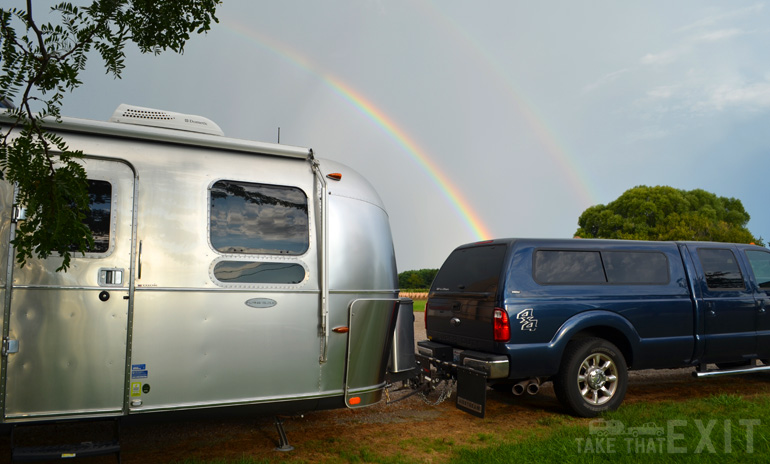 A beautiful double rainbow after a crazy rainstorm in Ohio!
A beautiful double rainbow after a crazy rainstorm in Ohio!
This post contains our Amazon affiliate links – if you purchase an item through one of our links we earn a small percentage of commission on your purchase. This keeps us on the road – and we are thankful for that! Shop Amazon here.
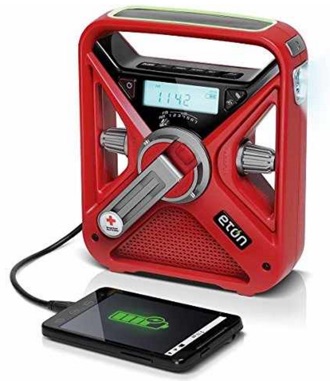
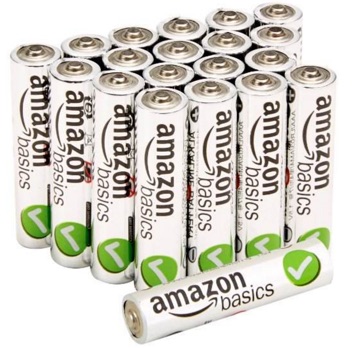
Thank you for sharing this information. You had clearly considered how to keep your family as safe as possible even before the tornado watches (including providing something for the kids to do while sheltering!). I’m an emergency manager by profession and I think this is an excellent post. Glad you didn’t have any damage from the storm.
Thank you for commenting Kathy! I’m glad that as an Emergency Manager by profession that you think my post is excellent – sounds like we are on the right track for staying safe on the road. Hoping the post helps other families stay safe on the road as well!
Great post and ideas! We loved RVing, but the storms always scared me to death. I think that is the one thing that would keep me from doing it full time! Prayers for continued safe travels for your family.
Oh my! You were in Sarasota during the storm! My daughter’s family was TENT camping on Tampa Bay! Excellent advice,I have some of the ideas in place! Right now our Airstream is in Fort Myers for body work! Hope to be back on the road in late Feb/March. Right now we are anticipating a BIG snow here in Va! Glad you were safe. Happy travels!
Thanks for the great info Heather! Bookmarked it. Even if we don’t live in the RV, still a great info. Keeping the family safe and being prepared is BEST.
Good advice for all travelers. I loved the lightning shot. Hard to get those.
As a native Minnesotan, I saw the same puzzlement and concern in my wife and children (natives of Washington State), when we moved from Seattle to Minnesota, last summer. Most people in the Midwest learn to ignore the “Watches.” When the sirens sound a warning, then we do watch the weather closer to see if we need to seek a shelter. When you are traveling in a trailer, you obviously need to check the weather and wind conditions even closer. Over time, though, you will just reflectively do these checks without the stress and concern.
Wow, Heather! You guys had a close call. I’m so happy you are all safe and being as proactive as you can. Great tips for anybody- traveling or not!
Great tips. I’m used to severe storms where I live but I also know how to ‘read’ the local weather from sheer experience; it’s a whole other factor when you’re in an unfamiliar area.
Right now, my family and I are on an RV trip and we are heading for Arkansas. To get there, though, we will have to pass through Oklahoma and they are having a lot of severe weather warnings right now and it is expected that they will be having a few tornadoes as well. Although we are considering stopping where we are for a few days and letting the storm over there pass, I think that it would be valuable for us to know what to do if we did happen upon a tornado situation. Thank you for sharing your experience of hiding out in the bathhouse, because it has made me realize that it is important to know where you can take shelter wherever you are.